Hurrying past Copenhagen’s Tivoli Gardens on the way to the city’s main train station, Lotte Bjerre Knudsen looks just like all the other commuters crossing the Danish capital.
But the woman dressed casually in jeans and a baseball cap with a small rucksack on her back is very far from ordinary.
Her contribution to science has changed our world for ever.
She is the mother of the ‘miracle’ drug contained in Wegovy and Ozempic, which has made her employers, Novo Nordisk, worth £150 billion, turning it into the biggest company in Europe in the process.
Yet despite that, Knudsen, 61, is not to be found quaffing Dom Perignon on her own Caribbean island, nor criss-crossing the world in a private jet.
She lives comfortably in this pleasant, but not showy, £900,000 apartment in central Copenhagen with her husband, Peter Mads Olsen, a secondary school sports teacher and chairman of Volleyball Denmark.
Mr Olsen drives a Tesla, but Lotte often prefers to take the train or walk. And the only possible pointer to her massive contribution to the science of food and eating is her own frequent posting of mouth-watering photos of food from swish restaurants the world over.
She has a very refreshing retort to those who might suggest she should be grabbing a share of those billions.

Lotte Bjerre Knudsen lives comfortably in this pleasant, but not showy, £900,000 apartment in central Copenhagen
Lotte Bjerre Knudsen’s (pictured right) contribution to science has changed the world forever
Knudsen (pictured holding a cocktail) is the mother of the ‘miracle’ drug contained in Wegovy and Ozempic
When asked recently whether she was dissatisfied with her contract, she told Der Spiegel: ‘Never, why should I be?
‘I don’t care that much about money, I’m a socialist! Here in Scandinavia, we teach our children teamwork from an early age. It’s not about the individual. And that’s how I am too. I have never asked for a raise in 34 years.’
The mother-of-one still commutes each day to Novo’s ultra-secure laboratory in the northern suburbs of Copenhagen, where she is Chief Scientific Adviser and head of IDEA (Innovation & Data Experimentation Advancement).
Of course, she’s had salary hikes along the way, but never ‘pushed’ for them, she says. ‘I can’t see that capitalism and money make people happy.
‘At Novo Nordisk, I have always preferred to use my credibility to demand more funding for science, not more salary for myself. I also have no intellectual property rights. They belong to the company because I gave them up when I was employed.’
That said, this month she was one of five winners of a prestigious Breakthrough Prize (known as the ‘Oscars of science’) at a star-studded ceremony in Hollywood. The winners share a cheque for $3million (£2.25million) of around £450,000 each.
And there is no doubt it was Lottes’s sheer determination that got Novo Nordisk to where it is today with a market capitalisation larger than AstraZeneca and BP combined.
It’s almost impossible to overstate the significance of Ms Knudsen’s discovery which reaches far beyond its monetary value.
The medication causes the pancreas to release more insulin which helps guard against diabetes and make people feel fuller more quickly.
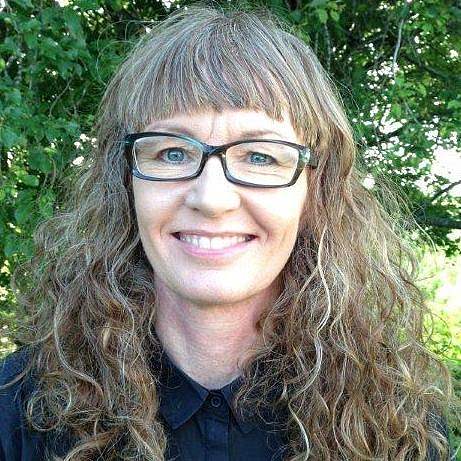
Knudsen, 61, is often dressed casually in jeans and a baseball cap
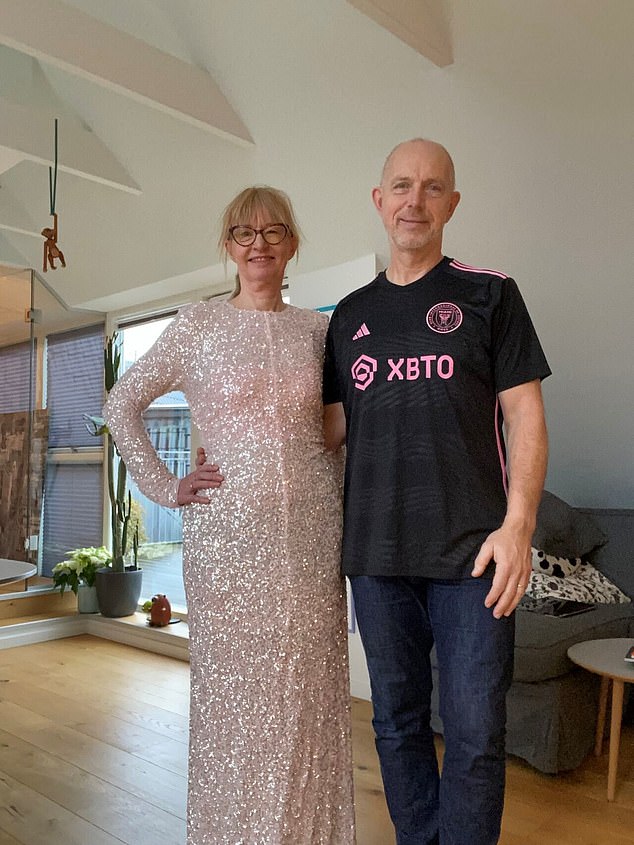
Peter Mads Olsen (right) is a secondary school sports teacher and chairman of Volleyball Denmark

The mother-of-one (pictured when she was younger) still commutes each day to Novo’s ultra-secure laboratory in the northern suburbs of Copenhagen
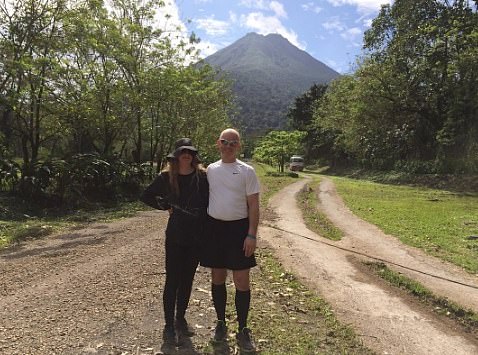
Knudsen is pictured out hiking with her teacher husband
As people all over the world, particularly in Hollywood, clamour for Ozempic, Novo Nordisk’s factories simply cannot produce enough of the drug to keep up with demand.
The British government even has plans to make the revolutionary weight-loss drug available over the counter from the NHS at pharmacies for the cost of a prescription, the Mail has revealed.
And it’s not just waistlines which are changing. Airlines are expecting to use less jet fuel because passengers will weigh less and kidney dialysis providers fear their market sector will shrink, along with their patients.
Lotte Bjerre Knudsen was pivotal to the development of the drugs with the active substances liraglutide and semaglutide, the key ingredient of Ozempic.
Her first degree was at the Danish Academy of Engineering, where she graduated in chemical engineering in 1989 and then began work at Novo Nordisk.
She joined a research group on a hormone called GLP-1, identified a few years earlier by scientists at the University of Copenhagen.
She returned from maternity leave in 1994 and found many of her former colleagues had been moved on to other projects.
Her new boss told her the team had failed so far to turn GLP-1 into a new drug for diabetes. But they (and in particular she) would be granted one more try.
‘You need to figure out what to do with GLP-1 and it has to be now,’ he told her.
She was only aged 30, and one of the youngest scientists in her department, and unlike many of them, had no Ph.D. She had never before led a drug development programme.
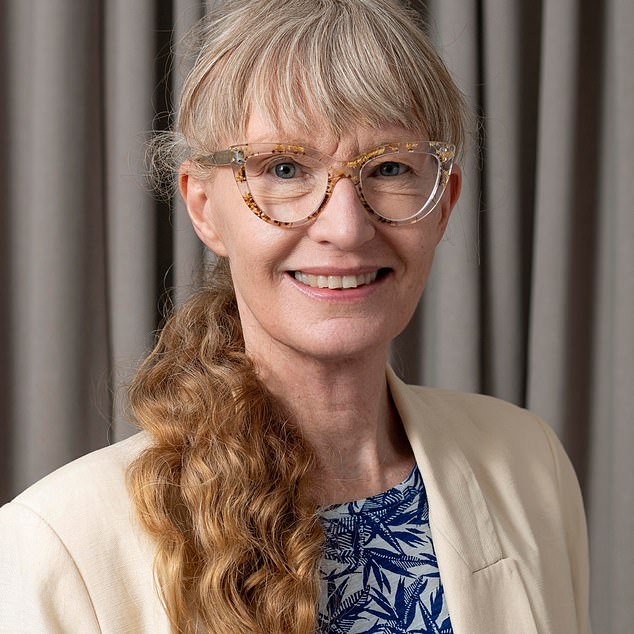
Knudsen, 61, is often dressed casually in jeans and a baseball cap
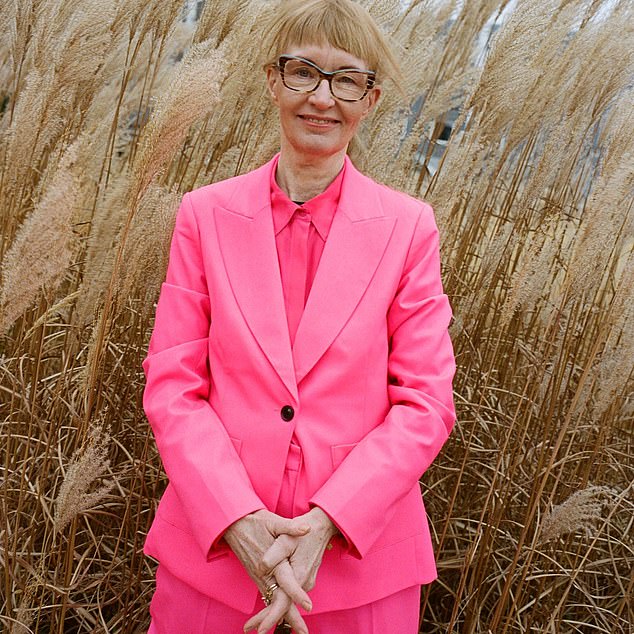
Lotte Bjerre Knudsen was pivotal to the development of the drugs with the active substances liraglutide and semaglutide, the key ingredient of Ozempic

Lotte Bjerre Knudsen speaks onstage during the 11th Breakthrough Prize Ceremony at Barker Hangar on April 5

Lotte (right) received a doctorate in medicine from the University of Copenhagen in 2014
‘I remember feeling a little bit scared,’ she told science website STAT in a recent interview. ‘The thing I kept going over in my head was, did I have the courage to actually lead?’
She found that she did. Eventually she created a longer-lasting version of GLP-1 that became liraglutide, approved in 2010 and sold as Victoza, which helped diabetics control their blood sugar and lose weight.
In time, and with input from other scientists, an even more effective version would soon follow in semaglutide, the active ingredient in Ozempic and Wegovy.
Now millions of people are being prescribed these drugs, weekly injections that curb appetite, tame food cravings, and melt the fat away. Demand is so high that Novo Nordisk can’t keep up, and has had to restrict shipments to the U.S. for new patients until the company can increase production.
Lotte received a doctorate in medicine from the University of Copenhagen in 2014.
Considering the impact that her discovery is having — and will have on the obesity epidemic — it’s perhaps not surprising to discover that Lotte’s own life has been inextricably linked with food from an early age.
Her mother was a chef and her father was an innovative farmer who wasn’t afraid to try new crops others eschewed. He was the first in Denmark to grow courgettes and spring onions.
And Lotte’s own Instagram account reveals something of an obsession with beautifully presented restaurant dishes she has enjoyed around the world when on business trips and holidays – and in Denmark itself.
The food journey enthusiastically chronicled ranges from Brussel sprouts, Cajun-style in New Orleans, to artichoke and cauliflower rice pilaf at ‘my absolute Oxford fav place’ Pompette, as well as many Copenhagen eateries – and some of her own attempts from home.
Her favourite restaurant is an Italian, called L’Enoteca di Mr. Brunello, handily close to the family apartment.
Owners Jennifer and Gildo Russo have become friends, says manager Marco Cenedese, 26, and during the 2020 lockdown, Lotte even posted that with the restaurant closed, she was cooking pasta with the couple.
The Michelin-listed restaurant is famous for its home-made mushroom ravioli with truffles. Marco says that Lotte often holds family meals and celebrations in the former bodega’s classic surroundings, with wine bottles stacked all around the walls.
Her personal favourite, as her Instagram attests, is the Brunello di Montalcino which Marco proudly plucks from his extensive wine cellar.
‘Lotte is a very nice lady,’ he told MailOnline.
‘We know she is a very famous scientist, but when she comes herea, she just wants to have a good time with her family and enjoy the food and wine.
‘She doesn’t tend to eat meat that often – more often vegetables and fish dishes.’
In fact, as Lotte told Der Spiegel recently, she’s actually trying to fast — so that she can eat whatever she wants without worrying.
‘I love food, but that also means I have to restrain myself,’ she said. ‘I’m experimenting with periodic fasting. That means I don’t eat anything before 11am or noon, and then only for eight hours.
‘I don’t do this to lose weight, but so that I can eat without thinking too much: even the delicious cake that is handed out in meetings.
‘But fasting has taught me how difficult it can be to control your appetite and say ‘no.’ Because it is often not true when obese people are confronted with the idea that it is their own fault for their weight. This is where genetics and biology meet the modern, affluent society.’







